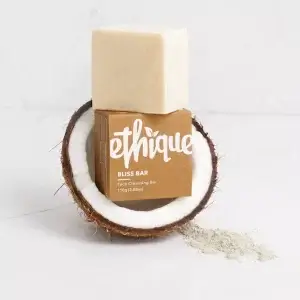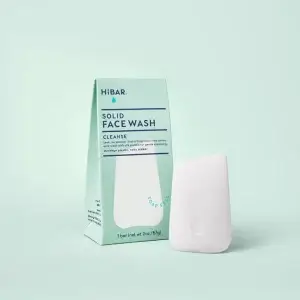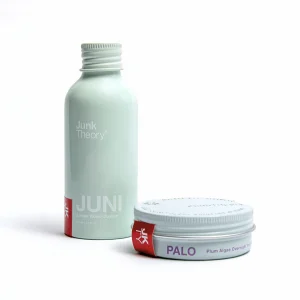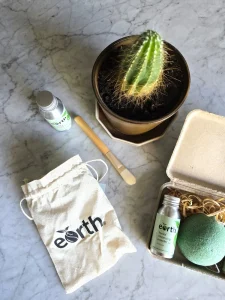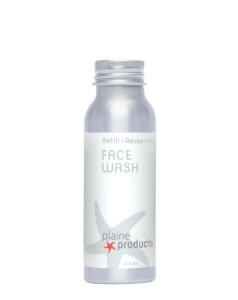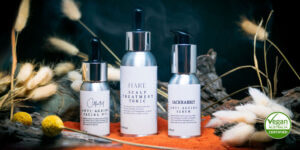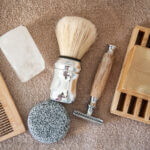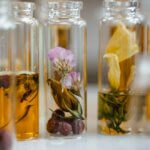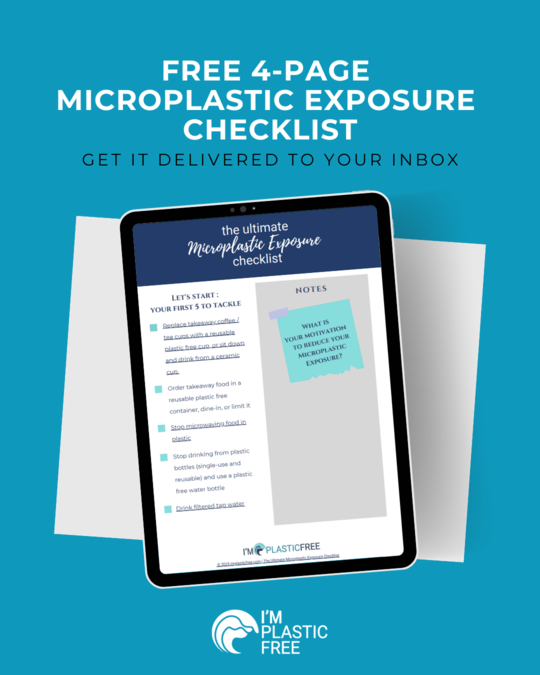Why You Should Switch to Plastic Free Skincare Brands

Plastic free skincare is a term used for eco-friendly skincare products which don’t contain plastics in the products themselves and in the packaging.
The Problem with ‘Recyclable’ Plastic Skincare Packaging
Plastic in skincare is a serious problem for our environment and health. Only 12% of plastic actually gets recycled due to issues with contamination. (Source: ABC) Many types of plastics actually cannot be recycled, and those that can, can only be recycled 2-3 times before the quality deteriorates and makes them unusable. The well-recognised “chasing arrows” symbols on plastic containers do not indicate that packaging is recyclable. The numbers inside the triangle between 1 and 6 indicate the plastic type, and only numbers 1 and 2 can usually be recycled.
Plastic packaging and ingredients such as plastic exfoliating microbeads end up in the oceans, and are ingested by marine animals and fish. Plastic makes it into human food chains from fish that’s eaten, causing health problems for humans as well as animals. Plastics leach hazardous chemicals, causing a range of health issues including cancer, as demonstrated by several studies published in peer-reviewed journals (1).
Single-use Plastic in Skincare Packaging
Most skincare packaging uses single-use plastics. This means the plastic is used once then disposed of, either in landfill or recycling. As we know, recycling plastic is far from a perfect system, and with Australians using 130 kg of plastic per person each year, up to 130,000 tonnes of plastic will find its way into our waterways and the ocean. (Source: WWF)
Globally, over 120 billion units of cosmetics packaging were recorded to be produced globally in 2018 as cited in a 2022 study on the “Reusability and recyclability of plastic cosmetic packaging: A life cycle assessment” (2) published in the Resources, Conservation & Recycling Advances (RCR Advances) Journal.
So it’s clear that we can’t rely on recycling despite many brands now offering their own recycling programs; ideally we should opt for zero waste skincare solutions that are circular or ‘closed loop’, so they don’t create any waste at the end of their life cycle.
Plastic is widely used as it is cheap and lightweight to transport, and if it’s thrown away by the consumer it means less expense for the company that made it, as they are not dealing with the ‘end of life’ of the packaging they produce. The only way this will end is when more consumers stop buying products packaged in plastic. Choosing sustainably packaged products in glass, aluminium and paper or cardboard supports businesses doing the right thing, so more businesses will become sustainable.
Microplastics in Skincare
Microplastics are tiny plastic particles that are less than five millimetres in size. There are two types of microplastics that come from the skincare industry;
- Microplastics created when plastic skincare packaging breaks down into smaller particles – for example plastic bottles floating in the oceans and exposed to UV from sunlight over time can break down into microplastics as they break up and degrade.
- Microplastics contained within skincare products themselves, such as tiny plastic exfoliating ‘beads’ found in exfoliants, scrubs, and toothpaste, to provide an abrasive action. Examples of microbeads in cosmetics are:
Common Microbead Ingredients
-
-
-
- Polyethylene (PE)
- Polyethylene terephthalate (PET)
- Nylon (PA) Polypropylene (PP)
- Polymethyl methacrylate (PMMA)
-
-
Why are Microplastics used in Skincare?
The big answer is that plastic is cheap, so microplastics make a cheap abrasive ingredient in products. Natural materials such as ground nut shells are a healthier and more eco-friendly choice for exfoliants, and are increasingly being used in place of microplastics, as awareness and concern about microplastics increases.
Why are Microplastics in Skincare Bad for the Oceans?
When skincare products containing microplastics are washed off the skin, the microplastics can enter the water supply, either through the drains in our homes or through wastewater treatment plants. From there, they can make their way into rivers, lakes, and oceans, where they can be ingested by aquatic animals like fish and turtles. This can cause serious harm to these animals, as the microplastics can block their digestive tracts and prevent them from getting the nutrients they need to survive.
Why are Microplastics in Skincare Bad for Health?
One of the main concerns about microplastics in skincare products is their impact on human health. When microplastics are used in skin care products, they can be easily absorbed by the skin, which is our largest organ, and enter the bloodstream. Once they are in the bloodstream, they can travel to different parts of the body, including the liver, the spleen, and even the brain. This can cause a variety of health problems, such as inflammation, hormonal imbalances, and even organ damage. A study published in 2023 the National Institutes of Health (NIH) (3) found that microplastics from face washes and scrubs had sizes around 660 μm.
Microplastics can also absorb toxic chemicals from the ocean and waterways, such as pesticides and herbicides, and then transfer these chemicals to the animals that ingest them. This can have a cascading effect on the food chain, as the contaminated animals can be eaten by larger predators, who can then become contaminated as well.
Related: 7 Best Plastic Free Eye Creams
5 Types of Plastic Free Skincare Brands: Our Non-Toxic Beauty Products Guide
- Solid skincare products packaged in cardboard or paper that activates with water.
- Concentrated, or Powder-based skincare – also called waterless skincare – packaged in cardboard or home compostable packaging that activates with water like powder face masks and exfoliants.
- Refillable skincare solutions where the “for ever container” is kept and refilled either via home compostable pouches or other types of refills.
- Circular / closed loop skincare where no packaging waste is created – such as dissolvable or compostable packaging solutions, or re-use systems for used packaging where it’s sent back, sanitised and re-used.
- Ocean friendly skincare made with all natural, organic and non toxic ingredients like sunscreens that don’t pollute waterways or kill coral. This term is often used to refer to the ingredients being ocean-friendly, but not always the packaging, so be aware.
1. Solid Skincare Brands
Solid skincare products often come in bars, like soap, and sometimes pastes. Some solids skincare examples are moisturizer bars made from solidified oils and waxes, or plastic free deodorant pastes or sticks. Solid or paste-based products can be rubbed on the skin directly. As they don’t contain water, they weigh less and are more easily transported. These products can be more easily packaged in non-plastic materials like tins or cardboard boxes.
Ethique Solid Beauty Bars
Ethique has been one of the pioneers who invented solid skincare since 2012.
HiBar
HiBar is a US brand that has created a solid range of zero waste skincare products like face wash and a solid oil cleansers.
Shop the HiBAR range on:
- Amazon USA
- HiBAR website – Get 20% off sitewide as a first time customer with code PLASTICFREECOM
- Biocasa Australia
Related: 7 Best Plastic Free Face Wash Brands to Supercharge Your Skincare
2. Concentrated or Powder-based Skincare / Waterless Skincare Brands
Powder based skincare activates with water. Some examples include powder based clay face masks, where water is added to make a clay paste, or foaming exfoliators or cleansers where water is added to lather up a foamy liquid to wash skin with. Other examples are concentrated skincare formula that do not contain water, which translates into reduced packaging and a lower carbon footprint. These innovative products can be packaged in cardboard, home compostable packaging, or often in recyclable aluminum containers.
JunkTheory – The Most Recyclable Earth-Powered Skincare
JunkTheory is a US based 100% natural skincare brand that has developed dermatologist-tested, vegan formulas that transform your skin while reducing your plastic footprint. The moisturizers and cleansers are concentrated and packed in fully recyclable aluminum. They went so far to eliminate pumps, since these can only be made with plastic and are not recyclable.
EORTH Australia – Earth Before Plastic – Plastic Free Beauty Products
EORTH Australia has handcrafted a range of Australian made skincare from Australian minerals and botanicals comprising of facial cleansing powders and clay face masks in powder formdesigned to nourish your skin while reducing waste.. They have three collections: “Amour” based on pink rose flower extracts, “Terra” a unisex range based on moringa leaf powder, and a “Soleil” range based on sweet citrus and honey myrtle.
All you have to do it to shake a small amount of powder into the palm of your wet hands, rub them together to activate the powder, forming a creamy paste, and gently massage the paste onto your face with your hand or a konjac sponge.
These products are packaged in aluminum bottles with compostable natural ink label. Bu purchasing their products you’re also supporting a regional based woman-led business.
- Shop EORTH Australia
Related: 7 Best Plastic Free Razor Options for Zero-waste Shaving
3. Close-Loop Skincare / Circular Skincare Brands
In this solution, no packaging waste is created, as the empty packaging is sent back to the manufacturer to be sanitised, refilled, and re-used. The concept is similar to the Refillable Skincare, but in this case the containers are going back to the manufacturer in a re-use system.
Highlights:
✅Returnable glass or aluminium refill bottles where the lid is aluminium and the original pump is kept, are a good choice as glass and aluminium are both infinitely recyclable, with higher recycling rates than plastic. Even better if there is the option to send empty bottles back to the company via carbon neutral post, to be sanitised and reused like Azur Pure Skincare’s closed loop refillable skincare system.
✅This solution is also perfect to support a local sustainable business, so you can bring back the emply bottles without having to ship them.
❌ Make sure the manufacturer offers carbon neutral post, as glass especially is heavy, and has a high carbon footprint.
Plaine Returnable and Refillable Skincare Products
Plaine offers returnable and refillable skincare products like face wash, body lotion etc. that are palm-oil free and zero waste since you can return them or decide to have them recycled. The products are free from synthetic fragrances, phthalates, sulfates, or parabens.
You order your preferred product and replace the lid with the pump, then you order a refill, then you use the return label to send the empty bottle.
Shop Plaine on: Amazon USA
Shop Plaine on: DoneGood marketplace
Le Lapin Closed Loop Skincare
Le Lapin creates luxurious vegan, refillable cosmetic products made in Australia for both men and women looking for all-natural formulations. All of their products come in aluminum bottles that can be returned for free to be cleaned, sanitized, and refilled, creating a true closed-loop system typical of the circular economy. All products are certified vegan by Vegan Australia and 5% of gross sales are donated to Bush Heritage Australia.
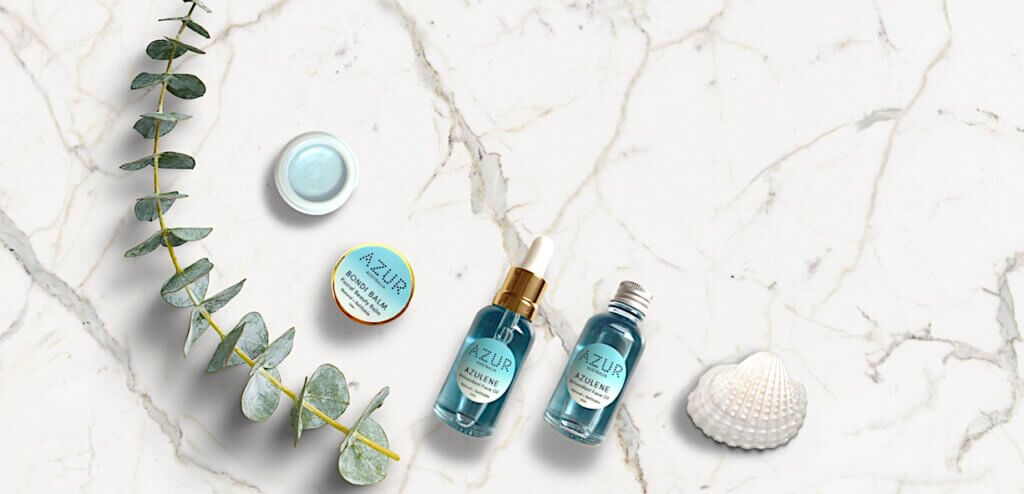
Image Credit: Azur Pure
Related: 5 Best Ways to Make the Switch to Plastic-Free Beauty
4. Refillable Skincare Brands
Refillable skincare can take several forms. It can be large refill containers in-store where customers take a container and refill it, or ‘refills’ which can be bought to fill up the original skincare bottle or jar when the product runs out. A key question to ask of refillable skincare is: what are the refill containers made from, and what happens to them after they’re used?
Types of skincare refills:
✅Forever glass or aluminium refill bottles where the lid is aluminium and the original pump is kept, or even better it has been designed out of the product. Usually one forever bottle is kept and then refilll pouches are provided by the manufacturer.
✅Compostable paper pouches for powder skincare products are a good sustainable choice as they can simply be composted at home or recycled with other paper and card. These materials break down naturally and don’t pollute waterways like plastic does.
❌ Plastic refill pouches aren’t sustainable unless they’re sent back and re-used
If refills come in plastic pouches, then while they may use less plastic than conventional packaging as they are thinner, unfortunately they are still not sustainable, as plastic pouches generally cannot be recycled. Even if they can, they are more likely to end up in waterways.
❌ Foil refill pouches have plastic lining so aren’t sustainable – the mixed materials also make them unrecyclable. No foil pouches exist that don’t contain plastic, sadly.
❌ Some “forever bottles” are made of virgin plastic, which defeats the purpose of being a sustainable brand. Some are at least made by recycled plastic. You have to read all claims.
Jade Beauty
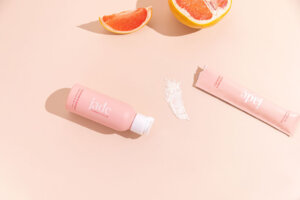
Jade Beauty was born as an Australian brand that offered cleansers and face washes in home compostable sachets to be used to refill your for ever container. Unfortunately, it ceased trading.
Related: Plastic Free Glitter: Which Cosmetic Glitter Brands are Biodegradable and Compostable?
5. Ocean Friendly Skincare
‘Ocean friendly skincare’ concerns the ingredients inside the product itself, as well as the packaging, which shouldn’t impact the ocean negatively by polluting it. The term is different to plastic-free skincare as it goes beyond the plastic content and also considers the ingredients of the products themselves; whether they contain harmful chemicals which cause problems for marine life like coral or fish if they get into our waterways.
The term ‘greywater safe’ refers to products which won’t contaminate waterways, land or drinking water with chemicals like triclosan, phthalates, parabens and silicones. So ‘ocean friendly’ can be considered to encapsulate both ‘plastic-free’ and ‘greywater safe’. Be aware that some ‘sustainable’ terms get used when they shouldn’t, so it’s important to be well informed – look at the ingredients, and research them using a site like EWG Skin Deep® Cosmetics Database, and look at the packaging and whether it contains single-use plastics.
‘Ocean Friendly’ is a term often used for products with safer ingredients, like natural reef-friendly sunscreen, but they can often be packaged using single-use plastics which are certainly not ocean friendly.
Sunbutter Reef Safe Skincare
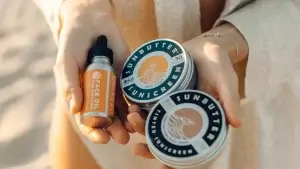
We included Sunbutter because it is a skincare brand that is “ocean friendly” but also cares about the packaging and it is, therefore, plastic free. Their SPF rated tinted sunscreen received approval from Australia’s Therapeutic Goods Administration (TGA), and they offer face oils, lip balms etc.
Shop Sunbutter from Biome Australia
Shop Sunbutter on Etsy
Related: 10 Plastic Free Sunscreen Brands for a Healthier You and Ocean
FAQ
What are the Best Plastic Free Skincare Packaging Options?
Sustainable skincare products are packaged in non-plastic materials like glass, aluminium, cardboard or paper, and have a closed loop or circular aspect where the packaging doesn’t end up in landfill. Glass, aluminium and stainless steel are infinitely recyclable, meaning they can be recycled limitless times. Paper or cardboard are also more easily recycled than plastic, and also break down and biodegrade.
Some products focus on being free of single use plastics, meaning they may include plastic components, or can be made entirely of plastic, but are intended to be reused as the products are refillable. Many products are made of ‘bio’ plastics, or plastics which claim to be biodegradable. These types of plastics can actually be more harmful to the environment than standard plastics, as many of them don’t entirely degrade, and break down into harmful ‘microplastics’…
Related: 6 Eco-Friendly Hair Brushes Not Made of Plastic
Final Thoughts: What are the Most Sustainable Plastic-free Skincare Brands?
The most sustainable plastic-free skincare brands take into account all aspects of sustainability; environment, human and animal health. Here’s a quick checklist:
✅ Packaging – glass, aluminium or paper / cardboard, perferably zero waste.
✅ Ingredients safe and natural
✅ Closed loop packaging system which doesn’t add to landfill
✅ Local to prevent air miles
❌ Single use plastic that might end up in the ocean
❌ Harmful ingredients like fragrance, PEGs (polyethylene glycols) methyl and propyl parabens, formaldehyde, phthalates, oxybenzone, triclosan or microplastics.
We hope that this guide was able to provide an overview of the innovative solutions in zero waste skincare. Alternatively, you can also opt for DYI zero waste beauty products with easy recipes to follow, mostly with ingredients you have already at home.
Related: 7 Plastic Free Essential Oils for your Home
This article was originally written by Anna Chatburn, Founder of Azur Pure Skincare, in 2022. Anna is a lifelong environmentalist and created Azur to provide a truly sustainable skincare range that’s natural, effective, and easy to use. It has been since updated by Simona Paganetto in 2025.
References and Scientific Literature Sources:
(1) https://pmc.ncbi.nlm.nih.gov/articles/PMC8427741/
(2) https://www.sciencedirect.com/science/article/pii/S2667378922000360
(3) https://pubmed.ncbi.nlm.nih.gov/36948433/
—
Discover more articles related to plastic free beauty.
Browse the I’m Plastic Free platform to discover zero waste skincare products.
